Staying sharp in the data realm is like juggling flaming laptops – challenging and a tad risky. To keep my executive skills from going the way of the floppy disk, I’ve committed to tackling a whopping 10,000 pages of books annually. Like private brain gym, but with more words and fewer sweaty towels. (Not only) for executive, reading 300+ pages book is a large time investment, so you better pick a worthy one. Therefore, below I( offer list of this year’s best reads in 2023, curated to inspire, educate, and maybe even give you a chuckle. Think of below listed books an potential beacon in maze of staying tuned to data wizardry!
Blue Ocean SHIFT
Topic | Innovation, Strategy
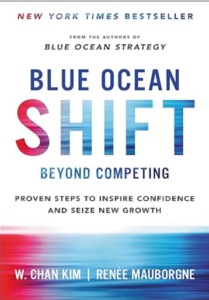 If you ever went through some Strategic management training, this name might ring the bell with you. You also might roll your eyes, as Renée Mauborgne and W. Chan Kim published their first introduction to Blue Ocean in 2004, so whooping 20 years ago. But wait I am not that ignorant, there is more to this suggestion.
If you ever went through some Strategic management training, this name might ring the bell with you. You also might roll your eyes, as Renée Mauborgne and W. Chan Kim published their first introduction to Blue Ocean in 2004, so whooping 20 years ago. But wait I am not that ignorant, there is more to this suggestion.
Blue Ocean strategy (BOS) is one of the major concepts in strategy how to differentiate your business from (blood thirsty, break-the-neck) competition. It is framework that enables you to innovate no matter how good/bad or unique your products or services are. If you have not read this book before, close the gap immediately. I used it several assignments of my career and the methodology always yielded interesting new business strategies.
However, even if you did read the original 2004’s Blue Strategy book, this one is different. Authors of the original concept bring additional insights how to not only design the differentiating strategy, but foremostly also how to implement it. They added and rewritten original scope of BOS based on learning from 20-years of implementing it in industries and public organizations. Hence the updated name reference to “SHIFT” in Title. I honestly think, this is a must read for any middle or top manager.
Link | https://www.amazon.com/Blue-Ocean-Shift-Competing-Confidence/dp/0316314048
.
AI 2041
Topic | Sci-Fi Fiction + AI commentary
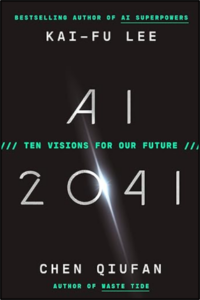 Many authors and books try to explain the major shift in ArtificialIntelligence (or AI) in last days. Few writers also dare to predict or speculate about where it might takes us from here further.
Many authors and books try to explain the major shift in ArtificialIntelligence (or AI) in last days. Few writers also dare to predict or speculate about where it might takes us from here further.
️ However, the book from Kai-Fu Lee and @ChenQuifan is very special and different. Kai-Fu is formal Executive from Google, Apple and likes, responsible for implementing AI solutions. When he talks AI methods, he most likely headed implementation of the early pilots of that. Real well of AI knowledge and experience.
He teamed with Sci-Fi author to write unique piece narrated by dozen of stories (all happening around year 2041). In each story/chapter they first introduce the future use of AI in real life, only to finish the chapter with facts and details of how this will be implemented and what is the realistic stage of future AI to expect before 2041.
The book is somewhat thick, but absolutely worth and easy to read, as you can dig through it one story at a time. I think it is especially good gift for somebody who wants to understand the (future) of AI, but does not have technical background to read white papers.
Link | https://www.amazon.com/AI-2041-Ten-Visions-Future/dp/059323829X
.
Becoming a Data Head
Topic | Data-driven, Management, Data literacy
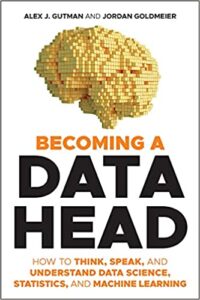 Decision to put this book on my reading list was stemming from the curiosity. The book reviews suggest that this book is good entry-book for executive trying to be data-driven or AI-ready. Being SVP Data & Analytics (and seasoned Data Scientist) myself, hardly the fit for my career phase. But I have seen so many books claim (and fail) to introduce you to Data Science bushes, that I was tempted on how this book will be doing? Yet another flat-falling promise?
Decision to put this book on my reading list was stemming from the curiosity. The book reviews suggest that this book is good entry-book for executive trying to be data-driven or AI-ready. Being SVP Data & Analytics (and seasoned Data Scientist) myself, hardly the fit for my career phase. But I have seen so many books claim (and fail) to introduce you to Data Science bushes, that I was tempted on how this book will be doing? Yet another flat-falling promise?
No, quite the contrary! This book really walks its talk. Namely walks you as user through different stages of Data analytics and Data Science smoothly. Even the basic concepts are explained in no-nonsense style that does not require any previous knowledge from you, but also does not insult (your intelligence) neither gets you bored, if you are reading things already obvious to you. You can also decide how “far into the woods” do you want to dive and stop reading any time you think this is exactly the level of understanding that is enough for you. Or maybe you look even deeper to understand the principles of what you just read?
I strongly recommend this book for anybody trying to change career into data jobs. I find it also great present for any manager or executive if you want to enlighten them in data.
Link | https://www.amazon.com/Becoming-Data-Head-Understand-Statistics/dp/1119741742/
.
COLORWISE
Topic | Data Visualization, Storytelling
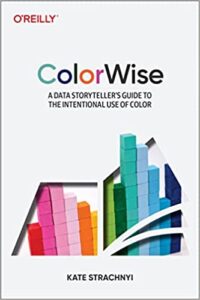 As somebody shaping (literally) thousands of visualization year after year, I welcome books describing the rules and good (and bad) practices for creating visualizations. I have few in my library (and suggested them in my previous reading lists), but they often talk more about what kind of graph to chose and how to shape the composition. Many of them take use of color for granted (or touch the issue only from the side).
As somebody shaping (literally) thousands of visualization year after year, I welcome books describing the rules and good (and bad) practices for creating visualizations. I have few in my library (and suggested them in my previous reading lists), but they often talk more about what kind of graph to chose and how to shape the composition. Many of them take use of color for granted (or touch the issue only from the side).
The ColorWise is book giving “color choice” and “color coding” in graphs and visualization full spot-light. It explains the background of colors in very non-academic way and surely taking you beyond your previous knowledge about color usage. It also gives clear guidance on how to create your graph color schemes, if you are anchored with some of the brand (must-have) colors. What is more, it goes also deeper into psychology of different color schemes and warns you about cultural or color deficiency pitfalls of your graphs. If you are already pro, you will often nod your head with “Exactly!” on your lips … and you still learn few new aspects to think about. If you are “regular” color user, your color coding skills will take significant boost. I strongly recommend for anybody , who needs to produce dashboards or presentations regularly in their work.
Link | https://www.amazon.com/ColorWise-Storytellers-Guide-Intentional-Color/dp/1492097845
.
BUILD
Topic | Strategy, Data, Product management
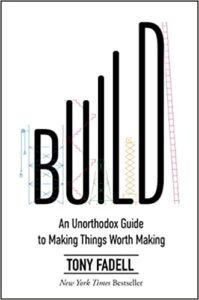 Many admire TonyFadell for what he achieved. He built iPod for Apple and basically saved Apple from falling. And then humbly he built iPhone on top. And if that would not be enough for you, then he built the brand new company Nest that started the whole SmartHome category of technology and sold it to Google for few billions. So certainly inspiring person enough. But if you are not a tech geek, you probably did not hear his name before or care too much. Nor did I. And I regret so.
Many admire TonyFadell for what he achieved. He built iPod for Apple and basically saved Apple from falling. And then humbly he built iPhone on top. And if that would not be enough for you, then he built the brand new company Nest that started the whole SmartHome category of technology and sold it to Google for few billions. So certainly inspiring person enough. But if you are not a tech geek, you probably did not hear his name before or care too much. Nor did I. And I regret so.
His book BUILD is interesting mixture of advice and guidance for people who want to have their life (and career) a bit more in their hands. He narrates the story from the adolescence through earlier years in job up to CEO-part of your life. And yes, maybe you will never (want to) be CEO, but the story is still a good guidance. It might sound fluffy, but whoever you are in business, I am quite sure you can take some benefit from some chapter of this book. Yes, occasionally you have to pardon him Tony’s American optics, but the smell of it is more like fragrance you know, but would not wear yourself, not a sensoric disgust.
I especially admire a chapter on how data plays different role in building individual phases of the product. It gives you clear idea guidance on where data is horse and where it is (still needed but rather) cart. Going through 3 layers of management (Team Lead to SVP) myself, I can confirm that his views of how to perceive your role is very accurate and I was amazed how he can compress the essence into (often just) few pages of the text.
All in all, this book is Masterpiece (uh, I told you that already, right? ). And I strongly suggest you to read it. The earlier the better. Because some of the lessons he gives I had to learn hard way and I only wished he had written that book earlier. Have a great read!
Link | https://www.amazon.com/Build-Unorthodox-Guide-Making-Things/dp/B09CF2YB6Z/
.
All in on AI
Topic | AI, Growth, Strategy
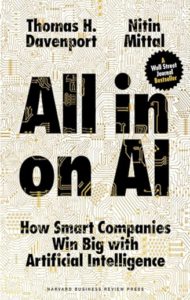 I have read most of 15 books that @DavenportTom authored and mostly were happy about them. Therefore, when I saw his newest piece ALL IN ON AI, I was full in anticipation.
I have read most of 15 books that @DavenportTom authored and mostly were happy about them. Therefore, when I saw his newest piece ALL IN ON AI, I was full in anticipation.
Author introduces group of businesses that decided to make artificialintelligence the center piece of their business strategy and operation. They really went ALL-IN on it. Book walks you first through how does such a AI-ALL-IN company looks like. What are common denominators, but also industry specific aspects. Quickly you understand how to spot the markers.
But that’s only start of it. In the remainder of the book Davenport (and his co-author) provide examples of how to your existing business into AI-ALL-IN state. They do it cleverly, picking real companies (‘ stories) from different maturity levels and industries. Authors also methodically link the needed AI-markers to the development in the stories, proving that common denominators are actually fitting and well chosen.
Who is this book for?
Well, for anybody who envisions or dreams about taking benefit of progressive technologies in their work. For those wanting to step-up or future-proof their business.
It’s also good gift idea for employees trying to pitch the AI change to top manager(s).
Link: https://www.amazon.com/All-AI-Companies-Artificial-Intelligence/dp/1647824699/
.
Good Data
Topic | Data, Ethics, Search data
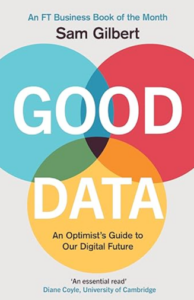 Reading Sam Gilbert’s book Good Data is stimulating and entertaining at the same time (you just need to see through authors masked humor). Sam is seasoned data professional, who does not fall into cliche and mental short-cuts oof today’s data speak.
Reading Sam Gilbert’s book Good Data is stimulating and entertaining at the same time (you just need to see through authors masked humor). Sam is seasoned data professional, who does not fall into cliche and mental short-cuts oof today’s data speak.
Not always had I agreed to his opinions, but all the questions he raised in the book made me really (re)think what I considered role of data to be in different corners of business and our society. Thus, if you ask “What questions should we have about future of data?” , this book will get you there.
.
Just for the answers to those questions, please, think a bit more critically than the author suggests. All in all, quick and fun to read, opening new horizons. Worth few days of reading.
Link | https://www.amazon.com/Good-Data-Optimists-Digital-Future/dp/1787396339
.
Don’t Make Me Think (Revisited)
Topic | UX, Product management, Web design
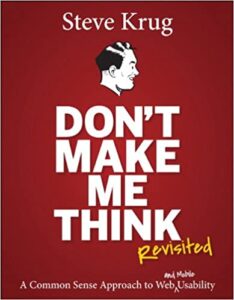 Web and App’s became our window of everyday activities, social interaction, shopping and most of of work (certainly so during COVID). In 1990’s and 2000’s institutions and businesses were trying to impress us by physical real estate. But how do us digital institutions treat now?
Web and App’s became our window of everyday activities, social interaction, shopping and most of of work (certainly so during COVID). In 1990’s and 2000’s institutions and businesses were trying to impress us by physical real estate. But how do us digital institutions treat now?
This book is for everyone, who wants to grasp the basics (yes, it is starting from ground) of how to design digital interface on web or app. Even though this might sound like UX designer guideline (which I was happy user if it was), it is really served in down to earth language and does not require from you any design domain knowledge. (but it leaves you with some after you read through).
It is not long read and I strongly encourage anybody interacting in our with Web and App’s (or have a say in their design) to at least skim through this. No regret move!
Link | https://www.amazon.com/Dont-Make-Think-Revisited-Usability/dp/0321965515
.
Extremely ONLINE
Topic | Creators, Social Media
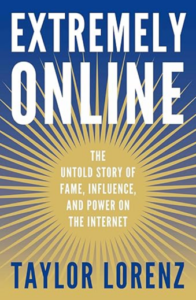 At first glance, the subject of online influencers might not seem like a page-turner. However, a friend’s recommendation led me to Taylor’s exploration of the hidden layers behind social media’s evolution, and I was instantly captivated.
At first glance, the subject of online influencers might not seem like a page-turner. However, a friend’s recommendation led me to Taylor’s exploration of the hidden layers behind social media’s evolution, and I was instantly captivated.
This book isn’t just a timeline of social media from the late 90s; it’s a narrative that weaves through the changing social dynamics influenced by online platforms. It provides an intriguing mix of statistical data and storytelling, revealing how various online communities engage with social media.
The book also offers surprising insights into questions like:
- What was the first major topic that sparked the blogging revolution?
- How did the requirement for influencers to disclose sponsorships impact the effectiveness of advertisements?
- What truly contributes to societal polarization if not social media algorithms?
- Which other social networks suffered at the hands of Twitter?
️| For those in marketing or content creation, this book is an essential read from start to finish. It’s equally crucial for parents or soon-to-be parents to understand the evolving relationship between kids and social media.
For me the book has a bit special twist, that is likely to work for you as well if you are in your late 30’s or 40’s. It maps the development of internet consumption for our generation, as when blogs hit the internet was exactly the time that our generation started to interact with it.
Link | https://www.amazon.com/Extremely-Online-Untold-Influence-Internet/dp/1982146869
.
Machine Learning Design Patterns
Topic | Machine Learning, Data Science
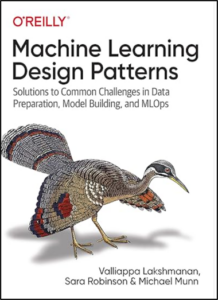 This book feels like the Swiss Army knife for machine learning enthusiasts. It’s the first of its kind as it dives into the wild world of ML design patterns. Forget about dry, technical jargon; this book is like a treasure map, guiding you through 30 quirky, yet ingenious design patterns, each one a secret weapon against those head-scratching ML problems. It’s like finding cheat codes for a video game, but for machine learning!
This book feels like the Swiss Army knife for machine learning enthusiasts. It’s the first of its kind as it dives into the wild world of ML design patterns. Forget about dry, technical jargon; this book is like a treasure map, guiding you through 30 quirky, yet ingenious design patterns, each one a secret weapon against those head-scratching ML problems. It’s like finding cheat codes for a video game, but for machine learning!
Imagine a cookbook, but instead of recipes for apple pie, it’s chock-full of solutions for when your AI project decides to go on a coffee break. Whether you’re a seasoned data scientist or just someone who accidentally wandered into the machine learning aisle, this book is your trusty sidekick. It’s the kind of read that makes you think, “Ah, so this is what Google’s brainiacs do for fun!” – solving problems and making ML as approachable as a friendly robot assistant.
Link | https://www.amazon.com/Machine-Learning-Design-Patterns-Preparation/dp/1098115783
.
CRUX
Topic | Strategy, Business Analysis
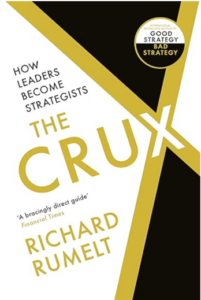 As someone with a background in Strategic Management, I’ve devoured nearly every strategy book available. Through my extensive reading, I’ve discovered two authors who consistently deliver valuable strategic insights: #GaryHammel and #RichardRumelt.
As someone with a background in Strategic Management, I’ve devoured nearly every strategy book available. Through my extensive reading, I’ve discovered two authors who consistently deliver valuable strategic insights: #GaryHammel and #RichardRumelt.
♂️ Therefore, to no surprise, Richard Rumelt’s #CRUX stands out as a masterpiece (again). It skillfully guides you in crafting authentic strategies for your business or team and shatters common executive misconceptions, like the necessity of a mission statement, misconstruing international expansion as strategy, or overvaluing shareholder interests. It’s also an excellent resource for learning to spearhead genuine strategic development.
I strongly recommend this book to all executives. Be prepared for a reflective and sometimes uncomfortable journey through your previous strategy endeavors. It’s equally insightful for middle managers, equipping them with the knowledge to challenge and refine the strategies proposed by their higher-ups. Overall, it’s a perfect read to gift yourself or others during a vacation.
Link | https://www.amazon.com/Crux-Richard-Rumelt/dp/1788169514
.
The Choice Factory
Topic | Marketing, Psychology, Feature engineering
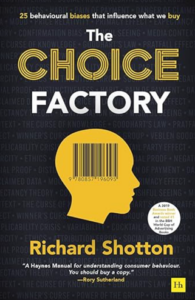 The Choice Factory” by Richard Shotton is an exceptional read, especially recommended for data analysts focused on human behavior modeling and prediction, as well as marketers seeking to boost their marketing conversions via leverage (or taking tail-wind of) natural human tendencies.
The Choice Factory” by Richard Shotton is an exceptional read, especially recommended for data analysts focused on human behavior modeling and prediction, as well as marketers seeking to boost their marketing conversions via leverage (or taking tail-wind of) natural human tendencies.
What sets this book apart is its reliance on proven real-world best practices, presented not as isolated case studies, but as principles backed by comprehensive research. Another key strength of the book also lies in its concise, easily digestible chapters, each ending with practical, actionable advice on how to implement these insights.
.
I strongly endorse this book for anyone looking to gain a deeper understanding of human behavior in feature engineering for ML prediction models or for marketing optimization context.
Link | https://www.amazon.com/Choice-Factory-behavioural-biases-influence/dp/085719609X
.
The Ruthless elimination of Hurry
Topic | Work-Life balance, Mental health
 The Ruthless Elimination of Hurry,” as the title aptly indicates, is more than just a book; it’s a compelling manifesto advocating for a deliberate shift away from the relentless pursuit of speed for its own sake.
The Ruthless Elimination of Hurry,” as the title aptly indicates, is more than just a book; it’s a compelling manifesto advocating for a deliberate shift away from the relentless pursuit of speed for its own sake.
In our fast-paced world, where speed is often synonymous with efficiency and success, this book presents a refreshing perspective. It acknowledges that while speed can be beneficial (except when it leads to a speeding ticket!), it shouldn’t be the primary objective. Speed should be a tool, employed judiciously and only when truly necessary. The book emphasizes the importance of intentionality in our actions, encouraging us not to rush mindlessly but to consider the purpose and value of our speed.
Authored by John M. Comer, a U.S. pastor, the book is understandably infused with religious references and teachings, particularly focusing on Jesus and other Christian elements. For some readers, this religious aspect might seem predominant, but the book’s core message transcends religious boundaries. If one can look past the religious overtones, or perhaps even draw insight from them, “The Ruthless Elimination of Hurry” reveals itself as a deeply thought-provoking and intriguing read.
It’s a book that challenges the status quo of our hurried lives. It invites readers to pause, reflect, and reconsider the pace at which we live. The author’s insights offer a unique perspective on how slowing down can lead to a more fulfilled, purpose-driven life. This makes the book an essential read for anyone feeling overwhelmed by the ceaseless rush of modern life and seeking a path to a more balanced, intentional existence.
Link | https://www.amazon.com/Ruthless-Elimination-Hurry-Emotionally-Spiritually/dp/0525653090
.
Data Science on AWS
Topic | ML operations, Data Science, Data engineering
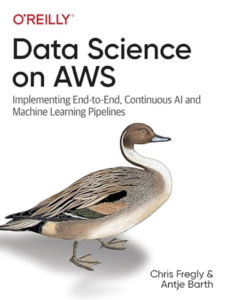 Ah, the wild ride of prototyping machine learning models! Many of us have gone through fast prototyping (or toy examples) of the Machine learning clustering or prediction models in notebooks or sand-box environments. It’s like building a Lego castle in your living room – fun, easy, and oh-so-satisfying. But then, you decide to move that castle to the real world, and suddenly, it’s like trying to assemble it in a windstorm. Surprise! Porting your perfect little prototype into the jungle of a live environment is like herding cats while juggling.
Ah, the wild ride of prototyping machine learning models! Many of us have gone through fast prototyping (or toy examples) of the Machine learning clustering or prediction models in notebooks or sand-box environments. It’s like building a Lego castle in your living room – fun, easy, and oh-so-satisfying. But then, you decide to move that castle to the real world, and suddenly, it’s like trying to assemble it in a windstorm. Surprise! Porting your perfect little prototype into the jungle of a live environment is like herding cats while juggling.
Most of today’s implementations are left with no choice but to run in cloud, virtual machines set-up. Requiring additional complexity and care to even deliver the bleak functionalities of the easy, local machine PoC. This book is about how to think of Machine Learning aspects of live solution in advance. To understand what combo of the tools one should expected to be deployed, to run your machine learning train properly on rails. It is must-read text not because you will be ever coding the things and connectors mentioned in material. It is essential rather because you need to understand what everything your teams have to go through to make it all happen for you.
Link | https://www.amazon.com/Data-Science-AWS-End-End/dp/1492079391
.
Text As Data
Topics: NLP, Machine Learning
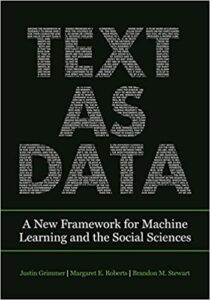 As the title of the book rightly suggests, text has been for long perceived as special “animal”. On the edge of the data analytics, much more obscure than analysis of the relational data by SQL or by Predictive analytics. Text analytics was also managed by dedicated (python) packages and often by NLP-specializing-only staff. If you were not one, you would probably just reach out for (simplified) predefined functions in NLTK (or similar code library).
As the title of the book rightly suggests, text has been for long perceived as special “animal”. On the edge of the data analytics, much more obscure than analysis of the relational data by SQL or by Predictive analytics. Text analytics was also managed by dedicated (python) packages and often by NLP-specializing-only staff. If you were not one, you would probably just reach out for (simplified) predefined functions in NLTK (or similar code library).
Those times are over. Text is mainstream. If you were not convinced before ChatGPT burst, now there is no way to disprove it. But Text analytics still finds the audience (and practitioners) left in pre-text era, only having rough idea how to address data that is stored in troves of text.
Therefore, This book comes as a kind of gift. If you admit to be one of those having general (read limited) only understanding of insight extraction from text and how to set-up the text analytics in your team, if you have not been treating text equally heavy as ML or Reinforcement learning, this book helps you to close that gap. It’s well written and always illustrated on telling examples. If you missed to buy the ticket for departing text analytics “train”, this is your fast track to get on it.
Link | https://www.amazon.com/Text-Data-Framework-Learning-Sciences/dp/0691207550
.
The Coming Wave
Topic | AI, Philosophy
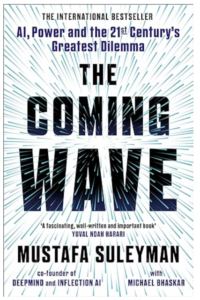 Hold onto your hats, folks! Mustafa Suleyman’s “The Coming Wave” isn’t just a book; it’s like a roller coaster ride into the future, where your coffee maker might be plotting world domination. Suleiman, the AI whiz-kid and DeepMind co-founder, is dishing out a buffet of mind-boggling predictions. Imagine a world where your vacuum cleaner is judging your music taste and your fridge is gossiping about your late-night snack habits. That’s the kind of AI party Suleiman’s inviting us to.
Hold onto your hats, folks! Mustafa Suleyman’s “The Coming Wave” isn’t just a book; it’s like a roller coaster ride into the future, where your coffee maker might be plotting world domination. Suleiman, the AI whiz-kid and DeepMind co-founder, is dishing out a buffet of mind-boggling predictions. Imagine a world where your vacuum cleaner is judging your music taste and your fridge is gossiping about your late-night snack habits. That’s the kind of AI party Suleiman’s inviting us to.
But wait, there’s a catch. It’s not all about tech wizardry and gadgets having a mind of their own. Suleiman waves a big, bright warning flag about AI’s dark side. Picture a world where AI is like that one overachieving cousin who’s great at everything but sometimes scares the living daylights out of you. He’s like the cool uncle of the tech world, telling us to enjoy the party but maybe hide the fine china just in case.
So, whether you’re a tech-head, a skeptic, or just someone who’s curious if your phone is silently laughing at your TikTok attempts, “The Coming Wave” is your handbook for the AI age. It’s like a survival guide for the digital jungle, complete with a map, a flashlight, and a slightly ominous warning about the creatures lurking in the shadows. Buckle up and get ready for a wild ride into the future, where your toaster might just be the smartest thing in your house!
Link | https://www.amazon.com/The-Coming-Wave/dp/1847927491
.
Julia High Performance
Topic | Data engineering, Data Science
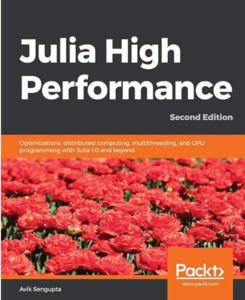 No, this is not a mesh of the Shakespeare’s famous love novel and Performance marketing guide. Julia might still be the new kid on the block in the programming world, especially compared to Python, the reigning “lingua franca” of data science. But don’t be fooled – this emerging language packs a punch with its speed and efficiency. “Julia High Performance” by Avik Sengupta and Alan Edelman is like the ultimate guidebook for this speedster of a language.
No, this is not a mesh of the Shakespeare’s famous love novel and Performance marketing guide. Julia might still be the new kid on the block in the programming world, especially compared to Python, the reigning “lingua franca” of data science. But don’t be fooled – this emerging language packs a punch with its speed and efficiency. “Julia High Performance” by Avik Sengupta and Alan Edelman is like the ultimate guidebook for this speedster of a language.
Think of this book as your go-to manual for making your code run like a sprinter on a caffeine high. It’s like a masterclass in getting the most out of Julia, from understanding its high-speed capabilities to avoiding performance roadblocks. While some readers might wish for a deeper dive into the more intricate examples, the book remains an eye-opener, proving its worth by empowering users to supercharge their projects, leaving Python in the dust. Some users even boasted a tenfold performance boost after switching from Python/NumPy to Julia – think about leaving the comfort zone and head towards a coding glow-up!
This book, admittedly, is a bit of the Joker card, but if you did not pick anything above and you are reasonably fluent in Python coding, maybe give it a try.
Link | https://www.amazon.com/Julia-High-Performance-Avik-Sengupta/dp/178829811X
.
Publikované dňa 17. 12. 2023.